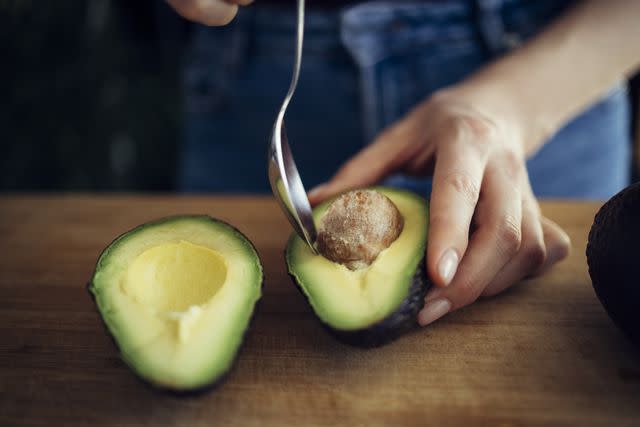Do Avocado Seeds Have Benefits, or Not?
Just because the internet says to consume them doesn't mean you should.
Medically reviewed by Elizabeth Barnes, RDN
Some claim the seed is the most nutrient-dense part of an avocado, but there's a lack of evidence that shows whether avocado seeds offer health benefits. It is unclear whether the seed is safe to consume.
The large seed makes up about 13% to 17% of the creamy flesh inside an avocado, which packs healthy fats and fiber. Read on to learn about where there are benefits to consuming an avocado seed and the possible risks.

miniseries / Getty Images
Related: Should You Eat Papaya Seeds for Parasites?
Nutrition of Avocado Seed
An avocado seed is a source of carbs, fatty acids, minerals, protein, and vitamins. Some evidence suggests that carbs make up nearly 65% of its dry weight. Protein makes up anywhere from 2.64% to 23%, and fatty acids make up 1.1% to 1.6%.
Research has found that avocado seeds contain antioxidants, such as flavonoids and phenolics. Antioxidants protect against cell damage, which might reduce disease risk. Those compounds have several other benefits, including getting rid of inflammation and lowering cholesterol.
There's limited data on the nutrient content of an avocado seed. In contrast, the avocado itself packs plenty of nutrients, including:
Calories: 322
Fat: 29.5g
Sodium: 14.1mg
Carbohydrates: 17.1g
Fiber: 13.5g
Added sugars: 0g
Protein: 4.02g
Risks of Avocado Seed
There's limited data on whether avocado seeds are beneficial and safe for humans. Existing studies have focused on the potential benefits of avocado seed extracts rather than the seed itself. Researchers have also only provided information on lab testing and not clinical data.
The California Avocado Commission states that the avocado seed contains compounds that are unsafe to consume. For example, avocado seeds contain cyanogenic glycosides, tannins, and trypsin inhibitors. Those compounds are antinutrients, which may decrease your body's ability to absorb minerals and vitamins.
Is It Safe To Consume Avocado Seeds?
Because the avocado seed is too hard to eat whole, you may see videos suggesting you chop it up into pieces and blend it. However, avocado seeds have not been proven to be safe to consume in any form. Therefore, no safe recommendations on how to eat avocado seeds can be provided.
Instead, stick to eating the avocado's creamy flesh: "It's chock-full of good fat, vitamins, minerals, antioxidants, and fiber," Cynthia Sass, MPH, RDN, Health's contributing nutrition editor, told Health.
Here are some ways to incorporate avocado flesh into your diet:
Add avocado to your favorite salsa or soup recipe.
Layer avocado slices onto a salad or sandwich, or top a veggie pizza with them.
Remove the avocado seed and replace it with two ounces of 1% cottage cheese for a protein-filled, fat-burning snack.
Spread mashed avocado onto a slice of whole-grain toast with scrambled eggs.
Related: How Safe Is It To Drink Tapioca Pearls in Bubble Tea?
A Quick Review
It's unclear whether it's beneficial, or even safe, to consume avocado seeds. The large seed is a source of antioxidants, carbs, fatty acids, and protein. Still, avocado seeds have high amounts of possibly harmful plant compounds.
You can find plenty of fiber, minerals, and vitamins in fruits and vegetables, including the avocado itself. Opt for foods like carrots, oranges, strawberries, and sweet peppers, which pack antioxidants that protect against cell damage.
For more Health.com news, make sure to sign up for our newsletter!
Read the original article on Health.com.

